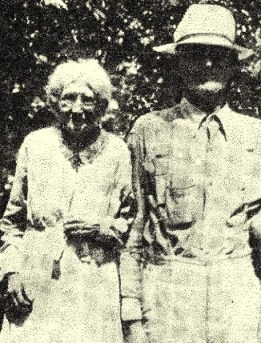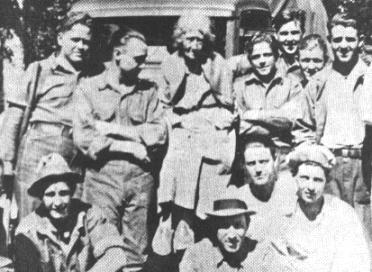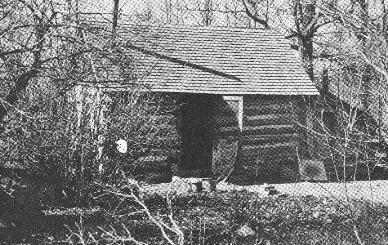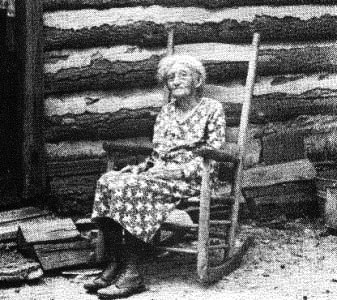Jean Wallace was born April 17, 1851 on a pier in New York City. Her father, William M. Wallace, a Scotsman, was a sea captain and her mother was an American. She was a direct descendent of William Wallace, the 13-14th century patriot who led a resistance against the English occuption of Scotland as portrayed in the film "Braveheart." (As noted in the opening quotation, her "sixth sense" was characterized among the Wallaces by being fair-featured whereas the rest of her family had dark features. Interestingly, William Wallace was also noted for having fair features. Could he also have been born with the second sight? If so, that would go a long way toward explaining his extraordinary victory at Stirling Bridge.)
Jean Wallace lived the first 40 years of her life in New York City, never marrying and working as a nurse. When she turned 40, she did something quite extraordinary even by today's standards, let alone by the expectations for a single woman in 1892. She left her previous life entirely behind and headed west, homesteading 160 acres in southwest Missouri, a place we now call Roaring River State Park. In 1892, this must have been one of the most gorgeous spots on the planet - a river that come gushing up from a cave beneath a mountain, a water-driven mill where area residents (many of them fellow Scots) would gather to celebrate the harvest, and gently rolling Ozark hills with abundant wildlife. Rather than choosing land in the valley, she homesteaded on top of a mountain overlooking Roaring River. There she built a cabin, planted her beloved peach trees, and lived for the next 48 years.
Jean Wallace inherited a gift from her Wallace side that some call the "second sight" or the "sixth sense." It was the ability to see into anyone's past or future. Here's how she described her method, according to Ms. Horner:
(She) described her facility as a feeling just like memory, but it applied to anyone and ran into the future as well as the past. "It is like walking along a road," she explained. "You can see quite a distance behind you and quite a distance ahead, but far away things begin to get dim in either direction." ...(T)he process was usually instantaneous and without effort. There was no crystal-gazing or any impressive hocus-pocus, perhaps because she never accepted any compensation for her mysterious services. She did often shut her eyes for a moment. Those eyes... were the bluest blue that had ever been seen in this part of the Ozarks. She was once a comely blonde, with honey-colored hair, yet she died an old maid, and she vowed she knew she would. Who would want a wife who not only knew everything her husband had done, but also everything he was going to do, or thinking of doing?
During those 48 years, literally thousands of people made their way up that Ozark trail to seek the advice of the one they called the "Mountain Maid." Many times, of course, the questions came from neighbors - "Where has my cow wandered off to now?" Other time they were from complete strangers - "Should I marry this man?" She would never charge for her advice - but if, come harvest, you had far more apples than you could possibly eat, she would be happy to take some off your hands. Or if you made a picnic out of visiting her and you just happened to have lots of food left over, she'd be willing to help you out so you wouldn't have to carry it back down the mountain. She lived like this for 48 years, using her gift to help people and accepting their generosity.
Ms. Horner's pamphlet relates many stories of how Jean Wallace used her gift. As she put it, "The road up to her cabin door was well worn by worried folks who had lost something or were at their wit's end about some personal problem. She delighted in greeting the stranger with the answer to his problem before he had time to state it... The stories are legion. Hundreds can relate similar memories."

Jean Wallace with long-time friend and
Roaring River Fish Hatchery employee Frank Hefley
Photo by Peggy Lawson, 1930s
|
Here are some of the shorter stories from the pamphlet:
"Troy Cornell, the rural mail carrier out of Seligman, delivered Miss Wallace's mail. He told of being surprised one morning to find her waiting at the box for him. She said she was awakened at 4 a.m. that morning and "knew" that Mr Reed had died at that time. Mr Cornell said he hadn't heard anything about it and felt that it probably wasn't true. But later in the morning he found that Mr Reed had died --that morning at 4 a.m."
"Several people, in telling of visits to the Mountain Maid, remembered that she didn't waste time with unbelievers. Mr Woods recalls a visit made by him and several friends to have their fortunes told. When he went in, she greeted him with, "You don't believe in me, do you?" He honestly replied that he had never believed in this kind of power of sense, and she stated emphatically that no information would he get. However, as he turned to leave she said, "But one thing I will tell you, you will have an automobile accident when you are about 50 years old." He said that although he thought of this prediction many times through the years, he had never confided it to anyone. But the automobile accident, a bad one, was true for Woods, and another prediction came true."
"Others who learned to their sorrow of her powers were hunters who invaded her 160 acres. She always knew they were coming and told them that nothing on her land was to be killed, not even a snake. She refused to have any timber cut from her land... her firewood had to be made from trees already dead or dying."
|
At age 88, Jean Wallace had lived in her little cabin overlooking the Roaring River valley for more than 48 years. She was by then too blind to read the beloved books that lined her cabin walls, too enfeebled to carry water the 200 yards up a steep path from the spring to her cabin. On February 26th, 1940, she died in a mysterious fire that consumed her cabin and everything in it. As Ms. Horner stated in her parting words in her pamphlet, "No longer does a loving public follow the trail to her door, but in the Roaring River area there will undoubtedly always be tales of Jeanne Wallace, the mysterious Mountain Maid of Roaring River."

During the 1930s, it became a ritual that the young men hired to convert Roaring River to a state park (the CCC Camp) would visit Miss Wallace. She often expressed her fondness for them. Photo by Johnnie Payton.

Jean Wallace's cabin overlooking the Roaring River valley, 1930s. Not pictured are the many cats whose company she loved. Photo by Pa Fields.
|
|
Excerpts from
"The Roaring River Suite"
Larry Carter, 1991, All rights reserved
Jean Wallace
On a mountain, far from the crowds
A woman dances alone in the moonlight
As the whip-poor-will cries in the twilight
Seer of what is to be, seer can you see me?
Wise Woman, living alone, can you hear me?
Though I'm not of your time, you are near me.
Near to my heart when you're dancing.
I'm the owl calling deep in the night
When the moon is silver and bright.
Jean Wallace, both maiden and crone,
I am calling.
By the owl in the night, I am calling.
When the full moon is bright, I am calling.
By all you know to be true
Jean Wallace, I'm calling to you.
Dance of the Mountain Maid
Mountain Maid, Mountain Maid
Come dance in the moonlight, Mountain Maid.
Dance to the tune the fiddler plays...
Can you hear me singing to you, Mountain Maid?
Ozark Mountain Maid.
Great Horned Owl, what do you see
Sitting in the top of the tall pine tree?
I see a lassie, and she's looking at me.
Ozark maiden, blessed be.
Grandmother Moon, what do you see
Shining through the top of the tall pine tree?
I see a Seer, and she's looking at me.
Scotland's Seers, blessed be.
|
Larry Carter, www.LCarter.Com
I am a musician, composer, playwright, actor and concert producer residing in Lawrence, Kansas. My band, Forest Green, performed these songs on the DVD "Scots on the Kaw" Go to
Lawrence Scottish Fest to see this video.
The Roaring River Suite
These two songs make up the third of four movements of "Roaring River Suite." The first movement captures the feel of the caves and the Native Americans who first lived in the Ozarks. The second movement speaks to the early white settlers who built the water-powered grist mill at the spring where neighbors would gather at harvest to visit and dance, then the burning of the mill during the Civil War. The final movement praises the timeless beauty of the Ozarks.
Tracie Snodgrass is one of the living experts regarding the life of Jean Wallace. Tracie is an actress who portrays the Mountain Maid in public events in and around Roaring River. See HERE for details, or contact her at the following: mtnmaid "at" mo-net.com
There is some confusion regarding whether the correct spelling is Jean Wallace or Jeanne Wallace. The Horner article uses the later, but copies of official documents at Roaring River's Nature Center suggest that the former is more accurate, so that is what I have used.






